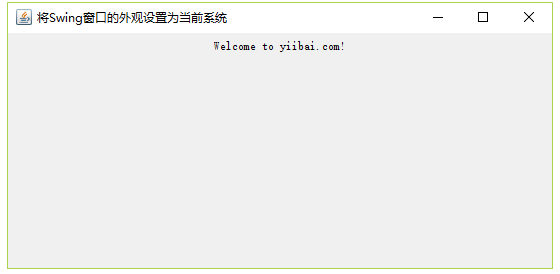下面的示例展示了如何将窗口的外观设置为基于Swing的应用程序中的当前系统。
使用以下API -
UIManager.getSystemLookAndFeelClassName()- 获取当前系统的外观。UIManager.setLookAndFeel()- 设置UI组件的外观。JFrame.setDefaultLookAndFeelDecorated(true);- 改变框架的外观和感觉。
示例
package com.zaixian.swingdemo;
import java.awt.BorderLayout;
import java.awt.FlowLayout;
import java.awt.LayoutManager;
import javax.swing.JFrame;
import javax.swing.JLabel;
import javax.swing.JPanel;
import javax.swing.UIManager;
public class SwingTester {
public static void main(String[] args) {
try {
UIManager.setLookAndFeel(
UIManager.getSystemLookAndFeelClassName());
} catch (Exception e) {
}
JFrame.setDefaultLookAndFeelDecorated(true);
createWindow();
}
private static void createWindow() {
JFrame frame = new JFrame("将Swing窗口的外观设置为当前系统");
frame.setDefaultCloseOperation(JFrame.EXIT_ON_CLOSE);
createUI(frame);
frame.setSize(560, 200);
frame.setLocationRelativeTo(null);
frame.setVisible(true);
}
private static void createUI(JFrame frame){
JPanel panel = new JPanel();
LayoutManager layout = new FlowLayout();
panel.setLayout(layout);
panel.add(new JLabel("Welcome to xuhuhu.com!"));
frame.getContentPane().add(panel, BorderLayout.CENTER);
}
}
执行上面示例代码,得到以下结果:

上一篇:
Swing框架和窗口示例
下一篇:
Swing列表框示例
